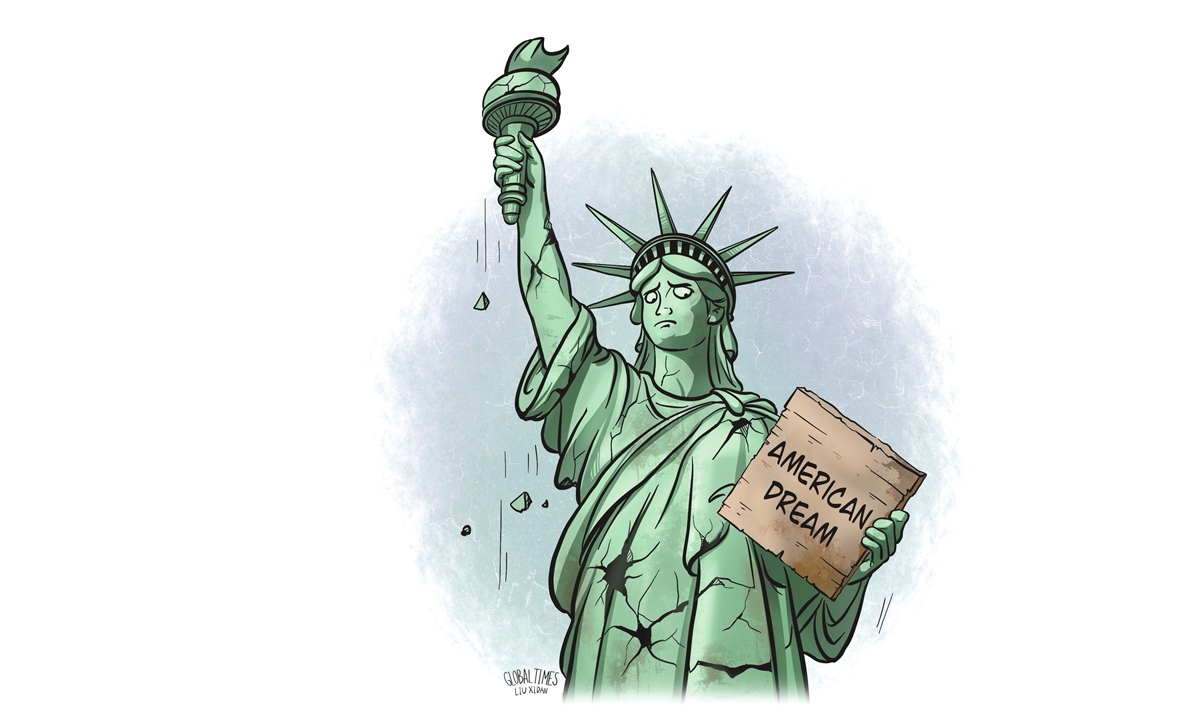
Illustration: Liu Xidan/GT
After reading Hillbilly Elegy, written by J.D. Vance, Donald Trump's vice-presidential running mate, many Chinese readers are shocked by the depth of poverty in parts of Ohio and Kentucky. These areas were once the heart of the US' industrial might.
Vance's family saga over three generations paints a vivid picture of the US' seismic shifts over the past half-century. It's not just a memoir; it's a scalpel dissecting the white working class, exposing the raw nerves of America's challenges, especially the stark generational divide in work ethic and values.
His hometown and surrounding areas face a myriad of social issues, including high divorce rates, domestic violence, drug abuse and inadequate healthcare. The breakdown of family structures and the erosion of community cohesion are also striking problems.
In Vance's narrative, the most alarming trend is that the young people there were gradually becoming cynical about work, hyper-individualistic, and disconnected from traditional values.
Why has the American Dream faded away? Can it be reclaimed?
This brings to mind US author Thomas Wolfe's observation in his novel You Can't Go Home Again: "You can't go back home to your family, back home to your childhood, back home to romantic love, back home to a young man's dreams of glory and of fame… back home to the old forms and systems of things which once seemed everlasting but which are changing all the time - back home to the escapes of Time and Memory."
Times have changed, and so have the challenges the US faces. This includes global competition in manufacturing, even though the country still leads in cutting-edge technology and its production.
Reading Vance's book, I felt it described an irrevocable transformation of times, people, society and spirit. However, learning about Vance's personal journey, I also sensed that the essence of the American Dream remains unchanged amid this transformation.
Vance rose from a low-income, socially tumultuous background to achieve a higher economic and social status through personal effort and education. This embodies the spirit of individual struggle and facing competition bravely, which is central to the American Dream.
The key question is, how can Americans revive this spirit of perseverance?
Now that Vance has become a partner to Donald Trump, he has the chance to become a significant player in Washington's decision-making circles if elected.
Now, in US politics, Democrats and Republicans offer competing prescriptions, but both face steep implementation hurdles. One common point in the path choices debated by the two parties is that there are no new tricks; all are traditional methods.
By implementing more conservative policies, treating internal diseases with external methods, building higher trade barriers to block foreign manufacturing and protect domestic industries, and using hegemonic tactics to stifle competitors' growth, the US risks becoming more insular, selfish and fearful, thus straying further from the core spirit of the American Dream.
How Americans rediscover work ethic and attitude will determine their future global standing and whether "Make America Great Again" is more than just a slogan. This depends on whether the US can embrace an endogenous spirit of tolerance, openness and brave competition.
The US faces a "new world" that Western civilization has never encountered in 500 years. To revive the American Dream must be based on a correct view of such a change.
The author is a senior editor with People's Daily, and currently a senior fellow with the Chongyang Institute for Financial Studies at Renmin University of China. dinggang@globaltimes.com.cn. Follow him on Twitter @dinggangchina



